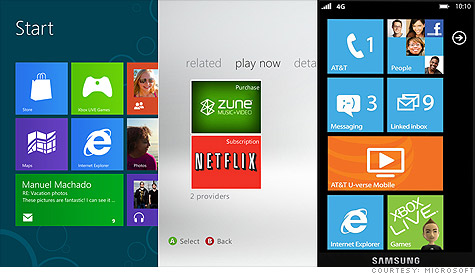Search News

Microsoft's desktop (left), Xbox (middle) and Windows Phone (right) will soon share one common interface.
NEW YORK (CNNMoney) -- Microsoft is staging a comeback -- and, unlikely as this sounds, it's one Apple and Google should be worried about.
Microsoft's recipe relies on three key ingredients: Windows, Windows Phone and Xbox. The secret sauce, which features a dash of Bing and SkyDrive, is still simmering. But Microsoft is nothing if not patient, and it thinks its trio of core consumer products will blend together in the next few years to form a major new ecosystem.
Here's the big vision: Whether you're using your TV, PC, tablet, phone, or almost any other device that comes along, you'll be able to accomplish all the same tasks through all the same platform. The form factor will change, but the core experience won't.
"People are starting to see the same look-and-feel across the three screens and the cloud," says Craig Beilinson, director of Microsoft's consumer marketing. "This is all going to get pretty blurry."
It's a vision shared by Apple (AAPL, Fortune 500) and Google (GOOG, Fortune 500), but their implementations are fundamentally different.
The linchpin of Microsoft's plan is Windows 8, which is set to launch this fall. The new operating system features touchscreen integration and the interactive tile-based "Metro" user interface, which debuted in late 2010 for Windows Phone 7 and made its way to Xbox last summer.
That lets Windows run -- quite well, according to early reviews -- on a host of new devices, including tablets, table tops, large touchscreen displays and convertible notebooks.
Microsoft is also baking cloud-based services like Windows Live, SkyDrive and Bing into all of its consumer products. Sign in on any device and you'll have access to all of your content, apps, preferences and search history.
Apple and Google's device ecosystems are more fragmented.
Apple says we're in a "post-PC" world. Its solution puts mobile devices like the iPad and iPhone at the forefront, envisioning the PC as a wholly separate device and platform. Macs integrate with iOS devices, but there's a clear schism in Apple's world view: Mobile devices are for content consumption, Macs are for creation.
For example, it's hard to build iPad apps on an actual iPad. To run Apple's Xcode developer software, you need a Mac.
Google's model focuses on the Web as the single platform of the future. It's a device-agnostic approach, but it requires constant connectivity. Once you go offline, your connection to Google's computing platform vanishes.
Right now, both are thrashing Microsoft in key markets. Microsoft has watched Apple race past it in media and tablets. Google captured search and the cloud, and both companies overtook Microsoft in smartphones. Meanwhile, sales of the PC -- Microsoft's bread and butter -- have stalled.
That puts Microsoft in an unusual position. It's the underdog.
Microsoft-turned-Google-turned-Microsoft engineer James Whittaker explained that phenomenon in a recent blog post about why he left his job as a head engineer on social network Google+ to return to Redmond.
Facing an existential crisis, Microsoft is making radical changes. Windows and Office "have clearly undergone some sort of genetic re-engineering," he says.
In a lightly veiled swipe at Google, he added: "Most big competitors don't want the disruption. When you make your money on the status quo, you are incented to move slow or not at all."
Microsoft can't afford to move slow. It knows that in five years, the PC won't be what it is today.
Your office desktop will probably still have a monitor, a mouse and a keyboard, but those are just accessories. As mobile devices get better and faster, they're taking over more of our computing tasks. Soon, a smartphone -- or a tablet -- could be your central device. Plug it into your desktop dock in the morning, then take it with you at night, and you'll have have an extremely portable, all-in-one computer.
That's the world for which Microsoft is building Windows 8. It can run everything from a touchscreen app like Angry Birds to resource-intensive software such as 3-D games and video editing tools. That sounds simple, but it's an all-in-one approach Microsoft's rivals have chosen not to pursue.
Windows 8 probably won't be an instant hit. It's a dramatic change, and corporate IT departments -- Windows' biggest customer base -- are slow to shift directions.
That's OK with Microsoft. It's prepared to play the long game, devoting years -- and, often, billions of dollars -- to cracking the markets it considers critical.
That's why it was willing to lose money for so long on Xbox, which recently became the world's leading game system. That's also why it is willing to plow billions each year into Bing, which remains a financial black hole.
"We're a company that has extraordinary patience," says Microsoft's Beilinson.
Patience is great, but execution is critical. Microsoft's mobile track record is littered with some spectacular failures -- like Windows CE, the mobile operating system designed to look and function like Windows on the desktop. Sound familiar?
There's signs Microsoft has finally learned from its previous catastrophes. Its "consumer preview" version of Windows 8 is drawing cautiously optimistic reviews.
Cnet reviewer Seth Rosenblatt calls it "the most ambitious operating system ever," with a "speed and responsiveness" that Windows has never had before. Gizmodo deemed it a "daring" and "brilliant," while The Telegraph says it's Microsoft's "most radical release in a generation."
All the reviewers point out a key question mark hanging over Windows 8: Developer support. The platform will only take off if software makers embrace it as a legitimate third player in the Apple-and-Google field.
That's why Microsoft is throwing everything it has into creating a new ecosystem. It can't afford to be wrong. ![]()